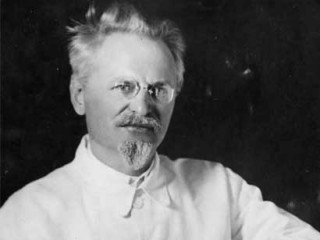
Leon Trotsky biography
Date of birth : 1879-11-07
Date of death : 1940-08-21
Birthplace : Yanovka, Ukraine
Nationality : Ukrainian
Category : Historian personalities
Last modified : 2010-05-20
Credited as : Political leader, Bolshevik revolutionary, Russian October Revolution
He was one of the leaders of the Russian October Revolution, second only to Vladimir Lenin. During the early days of the Soviet Union, he served first as People's Commissar for Foreign Affairs and later as the founder and commander of the Red Army and People's Commissar of War. He was also among the first members of the Politburo.
After being imprisoned for years in Siberia, and being exiled from Russia when Joseph Stalin became the new leader of Russia, Leon Trotsky started his political career when he became the leader of the October Revolution of 1917. He was later appointed the commissar of foreign affairs under Vladimir Ilich Lenin. His writings display his deep philosophical beliefs as a theorist for fundamental communism, but later he leaned towards social democratization.
Trotsky was born into a Jewish family. His father was David Bronshtein and his mother was highly educated. He was the only one of their children to survive infancy. Although the family was of the middle class, young Leon was sent to study in Odessa – a formal education was a central part of his parents’ belief. Over the course of nearly 10 years, Trotsky lived with his cousins, who were open-minded intellects. While completing his education, he was made aware of the theories of Marxism and thereafter helped form the South Russian Workers’ Union.
Within two years of the turn of the 20 th century, Trotsky was sent to serve a four-year sentence in Siberia for his revolutionary connections. While there, he married and had two daughters, whom he would never see once he escaped with forged papers under the name Trotsky and thereafter went to London. While in Paris he had two more sons after marrying Natalya Sedova. He went to Brussels supporting his party, but his theories had evolved by this point to a form of democratic socialism.
Soon after, Trotsky moved back to his homeland and became the leader of a workers’ party that was in favor of revolution. Trotsky was again jailed and while there wrote some of his most renowned political essays. He escaped Siberia again and went to Vienna, where he worked during the Balkan Wars. He joined up with the social democrats once more and was forced to leave France and Spain due to his beliefs against the war.
Upon returning to Russia, Trotsky was admitted into the Bolshevik Party, even though he had been jailed again. He was released and made chairman of the Petrograde Soviet of Workers’ and Soldiers’ Deputies. When Trotsky wanted to argue against accepting terms from Germany for annexation, Lenin wanted to have more time to get the Soviet state in order, but Trotsky wanted nothing to do with resolving the issue, although he didn’t want war either. What eventually occurred was the Russian Civil War and the expectation that Trotsky's leadership would revive the economy with militaristic precision. When Lenin knew that his time to lead Russia would be short, he asked for Trotsky’s help in getting Russia’s foreign policy back in order. By 1928, Trotsky was exiled again and eventually ended up in Mexico, where he was assassinated according to Stalin’s plans.
















